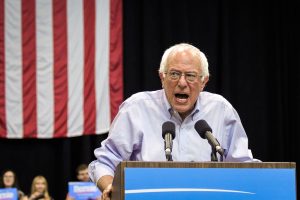Sanders Wants to "Transform the Democratic Party" — But Is It for the Better?

Sanders knows it isn’t easy to start a grassroots socialist movement in America. (Flickr)
With a little more than two weeks left in the Democratic presidential primaries in the territory of Puerto Rico and in the state of California — where 60 and 475 delegates are at stake, respectively — Sanders has not only proven that the Puerto Rican left’s biggest enemy is not colonialism, but capitalism and free markets.
Factions that for decades have gone against colonialism and imperialism are now packing an auditorium wanting to hear what Sanders has to say. He knows he has lost the nomination and it is only a matter of time before the superdelegates of the Democratic Party crown Hillary Clinton as their main leader ahead of the November presidential elections, and so Sanders has made his intentions quite public, attempting to tilt the party toward a radical left.
Sanders, who has been a socialist activist all his life, knows it is not easy to create a grassroots socialist party in America — let alone use the word “socialist” in the name of any movement — so he has been forced to do so from within.
This is all very similar to what former Congressman Ron Paul tried to do in the Republican Party through the libertarian movement before being trapped by the party establishment (remember that mysterious 2008 Republican primary in New Hampshire?) and massive propaganda by the mainstream media.
For Sanders, things have been easier, because the message he promotes appeals to passion rather than logic. You can even watch a video on YouTube from 2002 in which Bernie was a member of the House of Representatives and not the Senate, where the Financial Services Committee of the House was questioning the then-Head of the Federal Reserve (Fed) Alan Greenspan about monetary policy.
Bernie Sanders was as passionate and illogical then as he is now, questioning Greenspan and Fed policies without using any solid evidence to back him up. He relies instead on rhetoric of the “rich vs. poor.”
On the other hand, when it was Paul’s turn, he questions the chief of the most powerful central bank in the world with facts, data and knowledge on economics. Most importantly, he speaks slowly and calmly compared to Sanders, who raises his voice and resorts to insults.
Sanders is firing his last shots because if he loses in California, he knows he has nothing more to look forward to. He knows his defeat in that state is a big possibility now that everyone is looking toward the presidential elections.
Sanders called for the party to change and move away from the status quo. Sanders said his goal is to “transform the Democratic Party. Make it a base party, in which the party’s energy is focused on working families, trade unionists, environmentalists and people who want real political, social, environmental and economical changes.”
Sanders is calling Americans who communicate with radical left socialist ideals to enter the Democratic Party and radicalize it from within.
Approaches to democracy
We also need to see Sanders’ words in the same speech, in which he said that “democracy is not always pleasant, quiet and friendly.” When asked whether the Democratic convention to be held at the end of July would be a conflict, he said “so what if it is? … Democracy itself is somewhat agitated. Every day of my life is shaken. But if you want everything to be calm and orderly without a vigorous debate, that is not democracy.”
Seeing those words, we can deduce that for Sanders, socialism is an idea that should be imposed by force and should not be subject to the educated and passive analysis of an educated society.
Sanders is asking his followers to take the party by force if they want to advance his leftist agenda.
For Sanders, democracy is made up of groups with different ideas and ways of governing that meet in a troubled atmosphere — nothing peaceful and orderly.
Perhaps the reason Salvador Allende was overthrown in a military coup had to do with his inability to impose socialism by force in Chile as Fidel did in Cuba, Mao in China and Lenin in Russia, and not because Allende’s policies created an economic and social destabilization in the country.
Maybe that’s why Sanders strongly defended Fidel Castro’s regime in 1985, but never defended Allende, the martyr of Latin American socialists.
Only time will tell if Americans will make the same mistake that countries have suffered from after choosing socialist leaders in spite of decades of growth and economic prosperity.
No comments:
Post a Comment